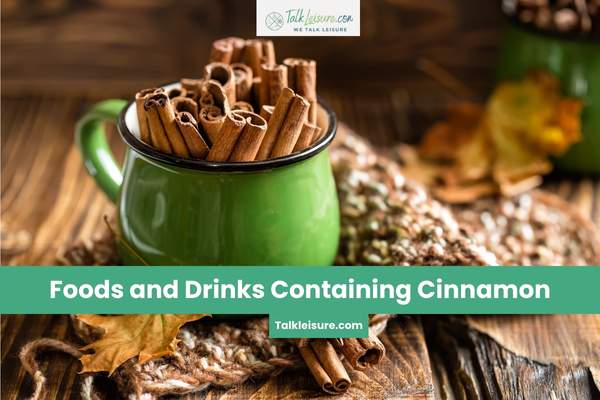Cinnamon is a popular spice that has been used for centuries to add flavor and aroma to food and drinks.
However, some people may be allergic or sensitive to cinnamon, which can cause various symptoms ranging from mild to severe.
It is important to understand the difference between cinnamon allergies and sensitivities and how they can affect your health.
In this guide, we’ll explore what happens when our bodies don’t agree with cinnamon.
We’ll look beyond the surface and learn about the different ways cinnamon can affect us, especially if our immune system sees it as a problem.
What Are Cinnamon Allergies and Sensitivities?
Cinnamon allergies occur when your immune system overreacts to cinnamon proteins, which can cause a range of symptoms such as hives, itching, swelling, and difficulty breathing.
In rare cases, cinnamon allergies can trigger anaphylaxis, a severe reaction that can be life-threatening.
Cinnamon sensitivities, on the other hand, are not immune-related but rather a reaction to the compounds present in cinnamon.
It can cause symptoms such as skin irritation, digestive problems, and headache.
Why Is It Important to Know About Them?
It is essential to know about cinnamon allergies and sensitivities to avoid potential health risks.
People who are allergic or sensitive to cinnamon should avoid consuming it in any form, including food, drinks, and even cinnamon-flavored toothpaste and mouthwash.
It is also crucial to read food labels carefully and inform restaurant staff about your allergy or sensitivity to cinnamon.
Moreover, if you experience any symptoms after consuming cinnamon, it is advisable to seek medical attention immediately.
Your healthcare provider can perform tests to determine if you have a cinnamon allergy and provide proper treatment and medication in case of an allergic reaction.
What Are The Foods and Drinks Containing Cinnamon?

Some popular cuisines that use cinnamon include Indian, Middle Eastern, and Mexican.
Cinnamon is commonly used in baked goods such as cinnamon rolls, pies, and cakes.
It is also a vital ingredient in warm beverages like apple cider, hot chocolate, and Chai tea.
One of the most popular breakfast choices, oatmeal, can also contain cinnamon as a flavor enhancer.
Snack foods like granola bars, trail mixes, and nuts are often seasoned with cinnamon as well.
Additionally, cinnamon can be found in many spice blends, like pumpkin spice.
When it comes to drinks, several options include cinnamon. Some people enjoy cinnamon in their coffee, while others prefer it in their tea or hot cider.
There are also specialty cinnamon-flavored drinks like cinnamon vodka and cinnamon whiskey.
It is crucial to note that people who are allergic or sensitive to cinnamon should avoid these foods and drinks.
Those who are not affected by cinnamon can enjoy these delicious treats as part of a balanced and healthy diet.
What The Common Symptoms of Cinnamon Allergies?
Cinnamon allergy symptoms can range from mild to severe, depending on the individual’s sensitivity level and the amount of cinnamon ingested.
Some common symptoms that people with cinnamon allergies may experience include:
- Skin rashes or hives
- Itchy mouth or throat
- Swelling of the face, lips, or tongue
- Shortness of breath or difficulty breathing
- Stomach cramps or nausea
In more severe cases, anaphylaxis can occur, which can be life-threatening.
Symptoms of anaphylaxis include difficulty breathing, low blood pressure, rapid heartbeat, and loss of consciousness.
Allergic Reactions Severity Levels
Cinnamon allergy symptoms can vary in severity.
While some people may experience only mild symptoms like an itchy throat, others may suffer more severe symptoms like anaphylaxis.
It is essential to consult with a healthcare provider if experiencing any allergy-related symptoms after ingesting cinnamon.
What Are The Causes of Cinnamon Allergies?
Cinnamon allergy is caused by a reaction to certain proteins in the spice.
The immune system mistakes these proteins as harmful and releases chemicals such as histamine to fight them off, leading to allergic symptoms.
Although anyone can develop an allergy to cinnamon, some people may be more predisposed to it due to genetic factors or a weakened immune system.
Additionally, those who have other allergic conditions such as hay fever or asthma may be more prone to developing cinnamon allergies.
Which Groups of People Are More Prone to Developing Cinnamon Allergies or Sensitivities?
Cinnamon allergies can affect anyone, but certain groups of people may be more predisposed to developing an allergy or sensitivity to this spice.
The underlying causes can vary between individuals, but genetics and a weakened immune system may be contributing factors for some.
People with other allergies, such as hay fever or asthma, may also have a higher risk of developing a cinnamon allergy.
In addition, individuals who are allergic to birch pollen, mug-wort, or related plants may experience cross-reactivity with cinnamon due to similar proteins that can trigger an allergic reaction.
It is important to note that cross-reactivity does not occur in all cases, and not all people with birch pollen or mug-wort allergies will experience a cinnamon allergy.
Diagnosis of Cinnamon Allergy

What Are The Allergy Test Methods and Procedures?
A doctor may recommend an allergy test to determine if someone has a cinnamon allergy.
Skin prick tests and blood tests are the two most common diagnostic methods for allergies.
Skin prick tests involve pricking the skin with a small amount of cinnamon extract and observing the reaction.
If a person has a cinnamon allergy, they will develop a raised and itchy bump at the injection site in around 20 minutes.
Blood tests measure the levels of specific antibodies that the immune system produces to fight against cinnamon proteins.
The doctor will take a small sample of blood and send it to a lab for analysis.
This test is useful for those who cannot undergo skin prick testing due to a skin condition or medication use.
In some cases, oral food challenges may also be conducted to confirm the diagnosis.
During this test, a person consumes a small amount of cinnamon under medical supervision to observe any adverse reactions.
Treatment and Management
What Are The Ways to Manage Cinnamon Allergy?
After a proper diagnosis of cinnamon allergy or sensitivity, management, and treatment are necessary to prevent allergic reactions.
Here are some ways to manage cinnamon allergy:
- Avoid consuming cinnamon-containing foods and drinks, including cinnamon-flavored gum and toothpaste.
- Read food labels and allergen charts to identify cinnamon in packaged and processed foods.
- Cook from scratch using fresh and unprocessed ingredients to control the ingredients and avoid accidental exposures.
- Use alternative spices and flavorings, such as nutmeg, ginger, cardamom, and vanilla, to achieve desired flavors.
What Are The Substitutes for Cinnamon in Cooking and Baking?
When managing cinnamon allergy, it is crucial to avoid all sources of cinnamon in food and drinks.
This may seem challenging, as cinnamon is a popular spice in many dishes.
However, there are several substitutes for cinnamon that provide similar tastes and aromas.
Here are some ideas:
Nutmeg
Nutmeg has a sweet and warm flavor that makes it an excellent replacement for cinnamon in baked goods, including cookies, cakes, and pies.
Allspice
Allspice is a combination of several spices, including cloves, cinnamon, and nutmeg. It has a warm and slightly sweet flavor and works well in sweet and savory dishes.
Cardamom
Cardamom has a sweet and spicy flavor that makes it a suitable substitute for cinnamon in foods like oatmeal, coffee, and tea.
Ginger
Ginger has a spicy and slightly sweet flavor that complements many dishes, including stir-fries, soups, and marinades.
Turmeric
Turmeric has a mild and earthy flavor and works well in rice dishes, curries, and roasted vegetables.
Vanilla
Vanilla has a sweet and floral flavor that adds depth to foods like oatmeal, smoothies, and baked goods.
Conclusion
Overall, managing a cinnamon allergy requires diligence in avoiding cinnamon sources and creativity in finding alternative spices and ingredients to add flavor to your meals.
Consulting with an allergist or registered dietitian can provide guidance and resources to make informed choices about managing a cinnamon allergy.
While cinnamon allergies are relatively rare, it is essential to be aware of the symptoms and avoid cinnamon in all its forms if diagnosed with this allergy.
Understanding food allergies, including cinnamon allergies, can help individuals manage them appropriately and prevent potentially life-threatening reactions.
FAQs
01.Does Cinnamon Cause Histamine Release?
For individuals with allergies or sensitivities to certain foods, it is essential to understand what ingredients to avoid.
Cinnamon is a popular spice used in many dishes and drinks, but it can cause histamine release, which can lead to allergy symptoms.
Histamine is a molecule produced by the body’s immune system to help fight off allergens and protect against infection.
However, in individuals with allergies or sensitivities, histamine can cause an overreaction, leading to symptoms like itching, swelling, and redness.
Cinnamon contains cinnamaldehyde, which is known to trigger histamine release in some individuals.
The severity of the histamine reaction depends on the individual’s sensitivity level, ranging from mild to severe symptoms, including difficulty breathing and anaphylaxis in rare cases.
It’s essential to note that not everyone will experience a histamine reaction to cinnamon.
Still, if you suspect you may have sensitivities to cinnamon or have been diagnosed with a cinnamon allergy, it’s best to avoid all sources of cinnamon in food, drinks, and personal care products.
02.Is Cinnamon An Inflammatory Food?
Apart from its potential to cause histamine release in some individuals, there has been some debate over whether cinnamon is an inflammatory food.
Inflammation is a natural response of the immune system to injury or infection.
Still, chronic inflammation can lead to various health problems like arthritis, heart disease, and cancer.
Some studies suggest that certain foods, including cinnamon, may contribute to chronic inflammation in some people.
Cinnamon contains cinnamic acid, which is believed to have anti-inflammatory properties.
However, some researchers suggest that consuming large amounts of cinnamon regularly could trigger an inflammatory response in some individuals.
This response may happen if the body overreacts to the cinnamic acid, leading to chronic inflammation in some cases.
03.Can Cinnamon Irritate the Digestive System?
While cinnamon has many purported health benefits, including anti-inflammatory properties and potential blood sugar regulation, it may also cause digestive issues in some individuals.
One reason why cinnamon could irritate the digestive system is its high levels of cumarin, a compound found in the bark of the cinnamon tree.
Cumarin can be toxic to the liver and kidneys in high doses, leading to digestive symptoms such as nausea, vomiting, and diarrhea.
Additionally, some people may have a sensitivity or allergy to cinnamon, which can cause allergic reactions in the digestive system, such as cramps and bloating.
Best Wishes!












